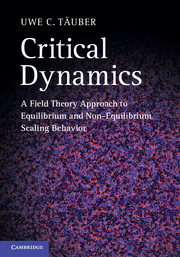Book contents
- Frontmatter
- Dedication
- Contents
- Preface
- Part I Near-equilibrium critical dynamics
- Part II Scale invariance in non-equilibrium systems
- 8 Non-equilibrium critical dynamics
- 9 Reaction-diffusion systems
- 10 Active to absorbing state transitions
- 11 Driven diffusive systems and growing interfaces
- Index
- References
8 - Non-equilibrium critical dynamics
from Part II - Scale invariance in non-equilibrium systems
Published online by Cambridge University Press: 05 June 2014
- Frontmatter
- Dedication
- Contents
- Preface
- Part I Near-equilibrium critical dynamics
- Part II Scale invariance in non-equilibrium systems
- 8 Non-equilibrium critical dynamics
- 9 Reaction-diffusion systems
- 10 Active to absorbing state transitions
- 11 Driven diffusive systems and growing interfaces
- Index
- References
Summary
We now begin our exposition of universal dynamic scaling behavior that emerges under non-equilibrium conditions. We are mainly concerned with the relaxational models A and B here, but also touch on other dynamic universality classes. First, we consider non-equilibrium critical relaxation from a disordered initial state, and compute the associated universal scaling exponents within the dynamic renormalization group framework. Related phenomena in the early-time regime, prior to reaching temporally translationally invariant asymptotics, are ‘aging’ and a non-equilibrium fluctuation-dissipation ratio, both of which have enjoyed prominence in the literature on ‘glassy’ kinetics. In this context, we derive the critical initial slip exponent for the order parameter, and briefly discuss interesting persistence properties. Second, we explore the long-time scaling laws in phase ordering kinetics and coarsening for the relaxational models, following a fast temperature ‘quench’ into the ordered phase, in systems with either non-conserved or conserved order parameters. Aside from a few explicit computations in the spherical model limit (wherein the number of order parameter components n → ∞), we largely employ phenomenological considerations and scaling theory, stressing the importance of topological defects for energy dissipation during coarsening. Next we address the question how violations of Einstein's relation that links relaxation coefficients and noise correlations might affect the asymptotic dynamic critical scaling behavior. Whereas in systems with non-conserved order parameter typically the equilibrium scaling laws are recovered in the vicinity of the critical point, in contrast genuinely novel universality classes may emerge in the case of a conserved parameter, provided it is driven out of equilibrium in a spatially anisotropic fashion.
- Type
- Chapter
- Information
- Critical DynamicsA Field Theory Approach to Equilibrium and Non-Equilibrium Scaling Behavior, pp. 309 - 344Publisher: Cambridge University PressPrint publication year: 2014
References
- 1
- Cited by

